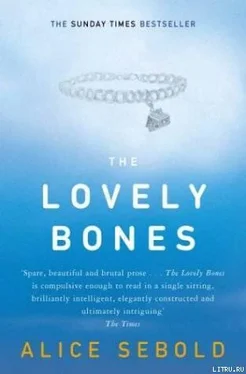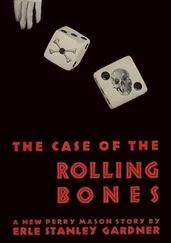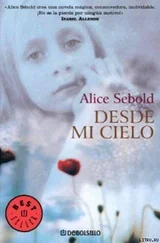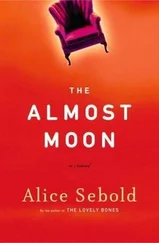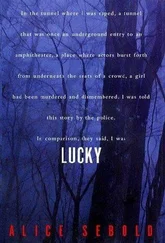Ever since the day he’d seen Ruana Singh and then had come home to find Len waiting for him, he’d felt my mother leaning heavily on the police. If my father said something that contradicted the police theories – or, as he saw them, the lack of them – my mother would immediately rush to fill the hole left open by my father’s idea. “Len says that doesn’t mean anything,” or, “I trust the police to find out what happened.”
Why, my father wondered, did people trust the police so much? Why not trust instinct? It was Mr. Harvey and he knew it. But what Ruana had said was when I was sure . Knowing, the deep-soul knowing that my father had, was not, in the law’s more literal mind, incontrovertible proof.
The house that I grew up in was the same house where I was born. Like Mr. Harvey’s, it was a box, and because of this I nurtured useless envies whenever I visited other people’s homes. I dreamed about bay windows and cupolas, balconies, and slanted attic ceilings in a bedroom. I loved the idea that there could be trees in a yard taller and stronger than people, slanted spaces under stairs, thick hedges grown so large that inside there were hollows of dead branches where you could crawl and sit. In my heaven there were verandas and circular staircases, window ledges with iron rails, and a campanile housing a bell that tolled the hour.
I knew the floor plan of Mr. Harvey’s by heart. I had made a warm spot on the floor of the garage until I cooled. He had brought my blood into the house with him on his clothes and skin. I knew the bathroom. Knew how in my house my mother had tried to decorate it to accommodate Buckley’s late arrival by stenciling battleships along the top of the pink walls. In Mr. Harvey’s house the bathroom and kitchen were spotless. The porcelain was yellow and the tile on the floor was green. He kept it cold. Upstairs, where Buckley, Lindsey, and I had our rooms, he had almost nothing. He had a straight chair where he would go to sit sometimes and stare out the window over at the high school, listen for the sound of band practice wafting over from the field, but mostly he spent his hours in the back on the first floor, in the kitchen building dollhouses, in the living room listening to the radio or, as his lust set in, sketching blueprints for follies like the hole or the tent.
No one had bothered him about me for several months. By that summer he only occasionally saw a squad car slow in front of his house. He was smart enough not to alter his pattern. If he was walking out to the garage or the mailbox, he kept on going.
He set several clocks. One to tell him when to open the blinds, one when to close them. In conjunction with these alarms, he would turn lights on and off throughout the house. When an occasional child happened by to sell chocolate bars for a school competition or inquire if he would like to subscribe to the Evening Bulletin , he was friendly but businesslike, unremarkable.
He kept things to count, and this counting reassured him. They were simple things. A wedding ring, a letter sealed in an envelope, the heel of a shoe, a pair of glasses, an eraser in the shape of a cartoon character, a small bottle of perfume, a plastic bracelet, my Pennsylvania keystone charm, his mother’s amber pendant. He would take them out at night long after he was certain that no newsboy or neighbor would knock on his door. He would count them like the beads on a rosary. For some he had forgotten the names. I knew the names. The heel of the shoe was from a girl named Claire, from Nutley, New Jersey, whom he had convinced to walk into the back of a van. She was littler than me. (I like to think I wouldn’t have gone into a van. Like to think it was my curiosity about how he could make a hole in the earth that wouldn’t collapse.) He had ripped the heel off her shoe before he let Claire go. That was all he did. He got her into the van and took her shoes off. She started crying, and the sound drove into him like screws. He pleaded with her to be quiet and just leave. Step magically out of the van barefoot and uncomplaining while he kept her shoes. But she wouldn’t. She cried. He started working on one of the heels of the shoes, prying it loose with his penknife, until someone pounded on the back of the van. He heard men’s voices and a woman yelling something about calling the police. He opened the door.
“What the hell are you doing to that kid?” one of the men yelled. This man’s buddy caught the little girl as she flew, bawling, out of the back.
“I’m trying to repair her shoe.”
The little girl was hysterical. Mr. Harvey was all reason and calm. But Claire had seen what I had – his look bearing down – his wanting something unspoken that to give him would equal our oblivion.
Hurriedly, as the men and woman stood confused, unable to see what Claire and I knew, Mr. Harvey handed the shoes to one of the men and said his goodbyes. He kept the heel. He liked to hold the small leather heel and rub it between his thumb and forefinger – a perfect worry stone.
I knew the darkest place in our house. I had climbed inside of it and stayed there for what I told Clarissa was a whole day but was really about forty-five minutes. It was the crawlspace in the basement. Inside ours there were pipes coming down that I could see with a flashlight and tons and tons of dust. That was it. There were no bugs. My mother, like her own, employed an exterminator for the slightest infestation of ants.
When the alarm had gone off to tell him to shut the blinds and then the next alarm, which told him to shut off most of the lights because the suburbs were asleep after that, Mr. Harvey would go down into the basement, where there were no cracks that light could peek through and people could point to, to say he was strange. By the time he killed me he had tired of visiting the crawlspace, but he still liked to hang out in the basement in an easy chair that faced the dark hole beginning halfway up the wall and reaching to the exposed baseboards of his kitchen floor. He would often drift off to sleep there, and there he was asleep when my father passed the green house at around 4:40 A.M.
Joe Ellis was an ugly little tough. He had pinched Lindsey and me under water in the pool and kept us from going to swim parties because we hated him so much. He had a dog that he dragged around no matter what the dog wanted. It was a small dog and couldn’t run very fast, but Ellis didn’t care. He would hit it or lift it painfully by the tail. Then one day it was gone, and so was a cat that Ellis had been seen taunting. And then animals from all over the neighborhood began disappearing.
What I discovered, when I followed Mr. Harvey’s stare to the crawlspace, were these animals that had gone missing for more than a year. People thought it stopped because the Ellis boy had been sent to military school. When they let their pets loose in the morning, they returned in the evening. This they held as proof. No one could imagine an appetite like the one in the green house. Someone who would spread quicklime on the bodies of cats and dogs, the sooner for him to have nothing left but their bones. By counting the bones and staying away from the sealed letter, the wedding ring, the bottle of perfume, he tried to stay away from what he wanted most – from going upstairs in the dark to sit in the straight chair and look out toward the high school, from imagining the bodies that matched the cheerleaders’ voices, which pulsated in waves on fall days during football games, or from watching the buses from the grammar school unload two houses down. Once he had taken a long look at Lindsey, the lone girl on the boys’ soccer team out running laps in our neighborhood near dark.
What I think was hardest for me to realize was that he had tried each time to stop himself. He had killed animals, taking lesser lives to keep from killing a child.
Читать дальше
